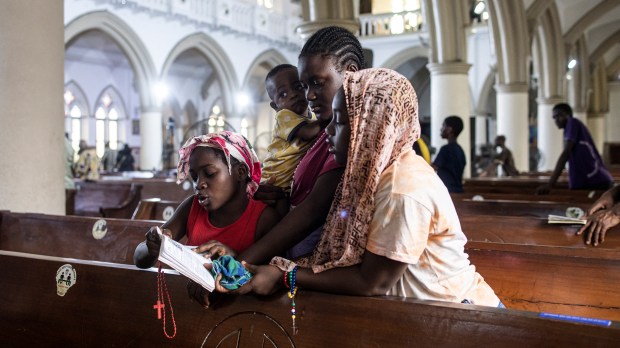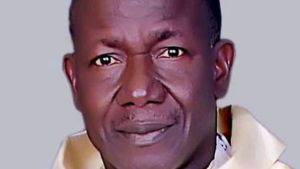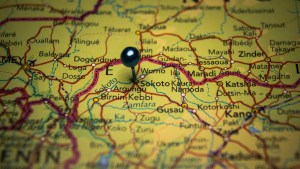On the evening of January 8, 2020, four students at the Good Shepherd Seminary in Kaduna, Nigeria, were taken captive by a group of armed assailants. Three weeks later, one of them was dead. While the three others were free, they were traumatized — one so much that he has been unable to return to the seminary.
One of the seminarians, Pius Tabat, who was 19 at the time, told his story to a group of journalists in an online forum this week. He told Aleteia that it was reasonable to assume that the motive for the kidnapping was primarily anti-Christian persecution.
“I think they were Fulani herdsmen,” said Tabat, who is from the northern part of Nigeria. “While we were in captivity they would not use English or Hausa but the language of the Fulani. I can’t say what their motives really were, but looking at the fact that the captives were Christians, and the way our churches and priests have been attacked, it’s not out of place to say that it was an attack on our Christian faith.”
He said that after a long, forced journey on foot and motorbike, the captors put the seminarians in a room with others they had kidnapped elsewhere.
“There was a boy there who was not of our faith. He began asking about Christians, and Michael had to explain our belief to him,” he said, referring to Michael Nnadi, the 18-year-old seminarian who eventually would be killed. “He became interested in the faith and asked to be taught the Our Father.”
“Why did you kill the seminarian?”
Bishop Matthew Man-oso Ndagoso of Kaduna, who also participated in the online forum, sponsored by Aid to the Church in Need, interjected. “The kidnappers were arrested and brought to the seminary by the police, to show security agents how they got into the seminary,” he said. “Then they were interviewed. ‘Why did you kill the seminarian?’ They told journalists that one reason was that he was asking for conversion, that you should leave the things you are doing. Michael knew they were Muslims, and yet he was preaching to them, asking them to repent. I listened to what Pius said, and I think you can see the connection. So if they saw that he was teaching one of the captives the faith they probably said ‘We have to get rid of him.’”
“His only crime was being a Christian,” Tabat said.
The seminarian went on to describe three weeks of captivity that were filled with flogging and humiliation, as well as psychological torture, with several instances of being made to believe that he and his colleagues would soon be killed.
“They kept on flogging every blessed day, without pity, without remorse,” he said. “They told us to moo like cows or bleat like goats, for their amusement – otherwise we’d get flogged. Other times we were told to sing a song and dance, blindfolded. And still we were being flogged while doing so.”
The captives were given something modest to eat and drink, but they had to consume this nourishment from the containers their captors used to get fuel for their motorbikes.
At one point they gave the seminarians’ cell phones back to them and instructed them to “call our parents to say goodbye before they kill us.”
It was “really hard” for their parents when they received the call.
“But, as God will have it, we were not killed,” he said, without explaining why. “Three days later, they told us we were going to be released. It sounded too good to be true. They dropped us in a village where the people had fled due to insecurity.”
The seminarians spent time in a hospital, as well as a center for psycho-spiritual treatment, to try to sort through the trauma.
Looking for hope
Bishop Ndagoso told the journalists on the call that they had just heard but one example of the problems Nigerians face on a daily basis. “This has been our daily life for many years,” he said. “The situation has not abated.”
Maria Lozano, head of press relations for Aid to the Church in Need, told journalists that last year 28 priests and a dozen nuns were kidnapped. Four priests were killed.
Many Nigerians were hopeful that recent presidential elections would lead to improvement in the dismal economic and security situation in the country, Africa’s most populous. The violence, in particular, is met with a half-hearted response from government officials, many have complained.
Christians in particular, Bishop Ndagoso said, were hopeful for new leadership that would ensure that all Nigerians are treated equally and fairly, according to the Constitution. Currently, he said, many are not, particularly in northern Nigeria, where many states are run with Islamic law, and Christians are second-class citizens.
But even during the presidential campaign, many expressed disappointment that the traditional practice of having both a Muslim and a Christian on each ticket gave way to both presidential and vice presidential candidates being Muslim.
One journalist asked whether some hope might be found in the fact that President-elect Bola Tinubu is from Yorubaland, in the southwest of the country, where Muslims are known to be more moderate.
“In Yorubaland you will find Muslims, Catholics, and Protestants in the same family, and they are indeed a model,” Ndagoso said. “Tinubu’s wife is a Christian and practices her faith in her husband’s house.”
Because Tinubu comes from that background, “we are hopeful,” the bishop said. “The results are being challenged in court. If he wins in the court, I think, given the part of the country he comes from, I think he will behave differently…. Religion is not an issue for [people from Yorubaland]. I would hope that he can bring that kind of attitude that they have in the southwest into politics. … and give us the kind of leadership that we need.”
Regina Lynch, director of programs for Aid to the Church in Need, said that there’s a “real danger we become complacent about conflicts that have gone on for a long time, that we turn away. The Catholic Church in Nigeria has a strong moral voice, but it cannot carry this weight alone.”
ACN is dedicating its Lenten campaign this year to Nigeria, and it recently published two reports to help people better appreciate the situation: Nigeria at the Crossroads and Nigeria: A Bleeding Wound.



